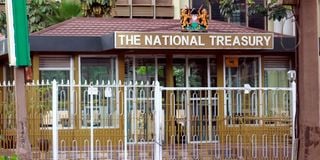Premium
Proposed law seeks to tie Treasury’s hands in spending public funds

The National Treasury Building in Nairobi. The National Treasury will now be required to seek the authorisation of lawmakers before spending public funds that have not been approved by the National Assembly.
The National Treasury will now be required to seek the authorisation of lawmakers before spending public funds that have not been approved by the National Assembly.
This will, however, only become a reality if the proposed changes to the Public Finance Management (PFM) Act sponsored by nominated MP John Mbadi are passed into law.
The Public Finance Management (Amendment) Bill 2023 seeks to provide a stringent procedure for incurring urgent or unforeseen expenditures for instance emergencies like epidemics, drought, floods or even war among others.
This, according to Mr Mbadi, will “effectively” put to a stop the abuse of public funds in the preparation and execution of supplementary budgets by government operatives.
If it becomes law in its current form, any government expenditure under the supplementary budget shall only be incurred in line with Article 223 of the Constitution.
The Article states that the national government may spend money that has not been approved by MPs if an amount appropriated for any purpose by the National Assembly is either insufficient or a need has arisen for expenditure for a purpose for which no amount has been budgeted.
Amend PFM act
“The Bill proposes to amend the PFM Act to provide for the procedure for incurring urgent or unforeseen expenditure as provided for in the constitution,” Mr Mbadi says of his Bill that seeks to repeal the entire section 44 of the law to introduce the stringent measures.
Sub-Article 5 of the provision states; “in any particular financial year, the national government may not spend under this Article more than 10 per cent of the sum appropriated by Parliament for that financial year unless, in special circumstances, Parliament has approved a higher percentage.”
The approval of Parliament for any spending of this kind is required within two months after the first withdrawal of the funds.
But the government has on numerous occasions incurred expenditures under the supplementary budget that have gone beyond the 10 per cent limit.
In some instances, expenditures have also been incurred under the supplementary budget on new items in the budget, putting to question the fiscal discipline of the government.
Under the Grand Coalition Government, supplementary budgets were only meant to serve emergencies like floods, drought or even war — among others that are unforeseen and, therefore, cannot be anticipated and budgeted for in the normal budget cycle.
The National Assembly is currently investigating the Sh6.2 billion buyback of Telkom Kenya limited by the national government without the approval of members of Parliament.





